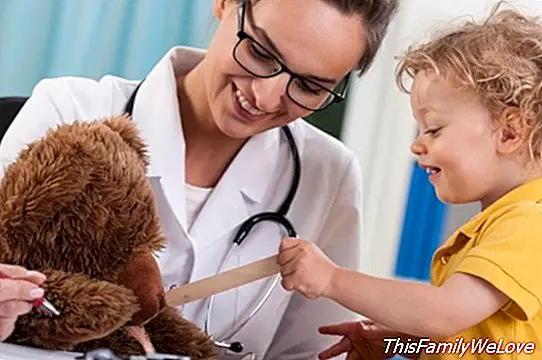Fear of going to the doctor, how to face it

When the time comes for the children to make a visit to the doctor fear appears irremediably. The white coat, the pain or simply the fear of the unknown make that, when the time comes, they do not want to go to the pediatrician or face it with tears and tantrums.
Thus, the adults themselves, who sometimes also showfear of going to the doctor, they must at least try that the visit to the doctor is not, for the smallest ones, an uncomfortable experience that they associate with the negative.
Initiative to lose fear of the doctor
The Association of Medical Students of the Complutense University of Madrid (IFMSA) has carried out an original project with the objective that children lose the fear of going to the doctor. Under the name The bear hospital, this project seeks to involve the little ones and make them lose their fear by bringing together groups of children of four and five years old to visit the Faculty of Medicine of the UCM. There they will "cure" their stuffed toys and "sick" toys and understand what the doctors are trying to do with them when they come to the clinic. In addition, twice a year, at the Doce de Octubre hospital, they teach sick children these same healing techniques.
Tips to help children lose their fear of going to the doctor
For this they must know that fear, which usually appears between six and ten years, can be addressed following a series of guidelines:
1. Notify the child in advance. If a child observes with surprise that his usual routine changes and that change is to go to the doctor, to the confusion will be added the difficulty to assume such unexpected and unwanted visit. Therefore, it is important for parents to notify children before going to the doctor and above all, never to deceive them under another excuse.
2. Identify the cause of the fear of going to the doctor. The first step to help a child face the time to go to the doctor is to identify the cause of their fear (pain, the doctor, tests, etc.) and show tolerance trying to understand, respect and thus help you overcome it .
3. Show the medicine through the game. Taking advantage of the fact that nowadays new technologies offer us a multitude of possibilities, parents must use this advantage so that, through interactive games on the Tablet or on the computer, the children know the medical instruments, the diseases and the different tests that a doctor can perform and thus reduce their uncertainty.
4. Keep calm. The children face the visit to the doctor with nerves. If they also observe that the adult who accompanies them shows a certain concern, they will immediately think that their fears are well founded and that something "bad" awaits them behind the door of the pediatrician's office. Therefore, it is important that the parents or adults accompanying them be the first to show tranquility, being able to transmit that peace of mind to the children.
5. Solve the doubts and concerns of the children. To eliminate the fear that children feel to be alone with the doctor, it is necessary to transmit closeness. Likewise, in order to face the fear of pain, parents must, above all, escape the lie, which will only work the first time and will make the child withdraw their trust. Finally, in the face of fear of the unknown, it will be beneficial to inform you beforehand of everything that is going to be done in a language appropriate to your age.
6. Transmit a positive image of the doctor. As happens when the father speaks badly of a teacher in front of a child, speaking against the doctor in front of the smallest will only worsen his disposition. Thus, the father must teach the child that the doctor's job is to cure and that thanks to him, that problem or that pain he has, will disappear. Likewise, it is important that parents never associate the doctor with a punishment.
7. Let the children talk. The conversation between a child and his pediatrician pursues the goal of creating a bond of trust by allowing the child to express himself and feel heard. However, it is often the parents themselves who make this task difficult, anticipating their children and answering for them. This habit, which is not very beneficial, should disappear so that, even if the doctor then consults the parents, it is the child in the first instance who speaks with his doctor and does so with total confidence.
8. Explain the role of doctors. As we have pointed out earlier, fear of the unknown is one of the problems that the child faces when he goes to the doctor's office. Therefore, teaching him what his work really consists of, explaining the tests he does and how they are done and the use of the instruments he uses, will make the child familiar and that, when he comes to the consultation, nothing is unknown or can not be generated, therefore, distrust.
9. Facing fear gradually. Trying to make fear disappear quickly as if it were a magic trick is a mistake. The most appropriate is to face it in a gradual and playful way, understanding that it is a process that depends on each child and may take more or less time depending on the personality of each one.
10. Try to always go to the same pediatrician. Once the child has managed to associate the pediatrician with someone they know and trust, it will be advisable to continue attending it, since the child will have gradually become familiar with it and it is important not to break that progress.
Patricia Núñez de Arenas




